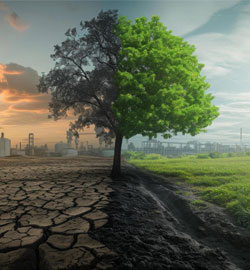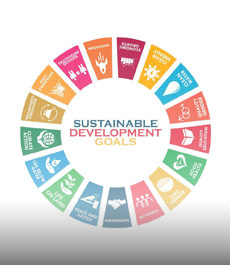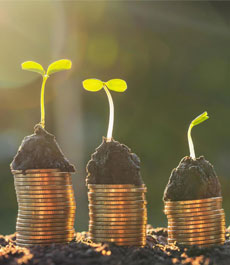
ESG Flash Cards
Adverse Impact:
Impacts of investment decisions and advice that result in negative effects on ESG / sustainability components.
Benchmarking:
The practice of comparing environmental, social, and governance metrics with other companies with the same metrics
Blue Hydrogen:
Hydrogen generation from fossil fuel coupled with capture and storage of the produced carbon. Although biomass, coal, and other hydrocarbon liquids can be gasified to generate H2 , natural gas can be formed from H2 using Steam-methane reforming (SMR) or autothermal reforming making capture of CO2 simpler than other methane combustion applications and easier to sequester.
Carbon Capture and Storage:
Carbon capture and storage (CCS) is the process of capturing waste CO2 and placing it into a geological storage site in such a way that it will not enter the atmosphere and contribute to further global warming. CCS uses several technologies including absorption, chemical looping, and membrane gas separation.
Carbon Disclosure Project (CDP):
CDP is a global non-profit organisation founded in 2000 and headquartered in London. CDP requests standardized climate change, water and forest information from some of the world’s largest listed companies through annual questionnaires sent on behalf of institutional investors who are endorsed as ‘CDP signatories’. These shareholder requests for information encourage companies to account for - and be transparent about - environmental risks.
Carbon Footprint:
A measure of the total greenhouse gas emissions produced by an individual, group, or company over a set time period.
Carbon Management and Accounting System (CMAB):
CMAB is a policy tool designed to address carbon leakage and ensure a level playing field for industries within the European Union (EU) that are subject to stringent carbon emission regulations. The CMAB aims to prevent companies from relocating production to countries with laxer environmental regulations and to encourage global reduction in carbon emissions.
Carbon Pricing:
Carbon pricing is a price or tax applied to carbon pollution. It can be an effective way to encourage emitters to reduce their CO2 emissions and thereby limit climate change. Carbon prices can be in the form of a carbon tax, or form part of carbon emissions trading, where ‘allowances’ are issued and traded.
Carbon Sequestration:
Carbon sequestration is a proposed way to slow the accumulation of greenhouse gases, mitigate climate change, and avoid climate change through long-term storage of CO2 and other forms of carbon.
Climate Action Tracker:
The Climate Action Tracker is an independent scientific body that tracks decarbonization initiatives by governments and measures them against the goals of the Paris Agreement. This seeks to limit the rise in global temperatures to well below 2°C above pre-industrial levels, and to pursue efforts to keep the rise to 1.5°C by the end of this century.
The tracker is a collaboration between two German organizations, Climate Analytics and New Climate Institute, that was founded in 2009 and is based in Berlin. It tracks data from 36 countries plus the EU, covering about 80% of global greenhouse gas emissions and about 70% of the world’s population
Climate Bonds:
Climate bonds are debt instruments used to finance or re-finance projects needed to address climate-related issues (e.g. wind farms, solar and hydropower plants, to rail transport and building sea walls in cities threatened by rising sea levels). Only a small portion of these bonds have actually been labelled as green or climate bonds by their issuers. (See the Climate Bond Initiative’s website for detailed information)
Climate Bonds Initiative (CBI):
Investor-focused no-for-profit international organisation working solely to mobilize the $100 trillion bond market for climate change solutions by promoting investment in projects and assets necessary for a rapid transition to a low carbon and climate resilient economy. The strategy is to develop a large and liquid Green and Climate Bonds Market that will help drive down the cost of capital for climate projects in developed and emerging markets; to grow aggregation mechanisms for fragmented sectors; and to support governments seeking to tap debt capital markets.
Climate Change:
Climate change is a long-term change in the average weather patterns that have come to define Earth’s local, regional and global climates.
Climate Change Adaptation:
“Economic activity reducing the negative effects of the current and future climate or preventing an increase or shifting of negative effects of climate change […].” (See European Commission’s proposal for a regulation on the establishment of a framework to facilitate sustainable investment – “Taxonomy proposal”, May 2018).
Climate Change Mitigation:
“Economic activity shall be considered to contribute substantially to climate change mitigation where that activity substantially contributes to the stabilization of greenhouse gas concentrations in the atmosphere at a level which prevents dangerous anthropogenic interference with the climate system by avoiding or reducing greenhouse gasemissions or enhancing greenhouse gas removals […].” (Taxonomy proposal, May 2018). Example: The UN-REDD Programme is the United Nations Collaborative Programme on Reducing Emissions from Deforestation and forest Degradation (REDD+) in developing countries.
Climate Clock:
A climate clock is a means of demonstrating how much carbon can still be released into the atmosphere without breaching the Paris Agreement. Two of the best known are the MCC Carbon Clock run by German scientists and a grassroots Climate Clock launched by a network of activists
Climate Clock:
A climate clock is a means of demonstrating how much carbon can still be released into the atmosphere without breaching the Paris Agreement. Two of the best known are the MCC Carbon Clock run by German scientists and a grassroots Climate Clock launched by a network of activists
Climate Disclosure Standards Board (CDSB):
A voluntary reporting framework for disclosing material environmental information in mainstream financial reports and natural capital and climate change-related information.
Climate Finance (Adaptation / Mitigation):
Local, national or transnational financing (drawn from public, private and alternative sources of financing) that seeks to support mitigation and adaptation actions or activities that will address climate change.
Climate Funds:
Climate funds are investment portfolios that seek to buy the equities or bonds of companies that are aligned with the goals of the Paris Agreement. They can also target the sovereign bonds of governments that are cutting greenhouse gas emissions, thereby reducing their contribution to global warming
Climate Risks:
Physical risks: Damages to companies and assets because of the physical impact of volatile and extreme weather events, for example, heat waves, droughts, rising sea levels, storms or flooding (including secondary financial impacts of extreme weather, such as lower crop yields, borrowers defaulting on their loans, disruption to supply chains, political instability, insurance claims or losses, legal damages, or conflict).
Community Impact Investing:
Directing investment capital to communities that are underserved by traditional financial services institutions. Community Impact Investing generally provides access to credit, equity, capital, and basic banking products that these communities would otherwise lack.
Corporate Citizenship:
The concept that corporations have both rights and obligations to the societies and jurisdictions in which they operate and are themselves stakeholders within society.
Corporate Governance:
The set of rules, practices and processes by which a company is managed (governed) and management is supervised.
Corporate Responsibility:
The responsibility of corporations to generate profit in an ethical way. Taking responsibility for a company’s impact on the environment and society.
Corporate Social Responsibility (CSR):
The responsibility of corporations to contribute positively to society. A corporation’s self-regulation that aims to contribute to societal goals of a philanthropic, activist, or charitable nature by engaging in or supporting volunteering or ethically-oriented practices.
CSR Report:
A CSR report is a periodic (usually annual) report published by companies with the goal of sharing their corporate social responsibility actions and results.
Decarbonization:
Decarbonization is the reduction in the carbon intensity of worldwide energy use. In line with this development, investment portfolios can also be decarbonized.
Development Finance:
Development finance refers to financial support (usually grants or concessional loans) from developed countries to developing countries, through local development banks or bilateral/multilateral development banks (EIB). The funds are provided to advance development in areas such as health, sanitation, education, infrastructure, and strengthening tax system and administrative capacity. (See OECD’s website)
Development Finance Institutions (DFI):
National and international development finance institutions (DFIs) are specialised development banks or subsidiaries set up to support private sector development in developing countries. They are usually majority-owned by national governments and source their capital from national or international development funds or benefit from government guarantees. This ensures their creditworthiness, which enables them to raise large amounts of money on international capital markets and provide financing on very competitive terms. (Source: OECD / EDFI)
The German Credit Institute for Reconstruction (Kreditanstalt für Wiederaufbau - KfW)
The KfW is a German public financial institution with a wide scope of action including:
- Domestic promotion: promoting the investments of private individuals, municipal enterprises and public institutions;
- Export and project finance: financing projects of German and European companies so they can compete on global markets;
- Development finance: supporting economic and social progress in developing and transition countries to help ensure the people there are better off;
The French Development Agency (Agence Française de Développement - AFD)
AFD finances, supports and aims to accelerate the transition to a fairer and more sustainable world. Peace, climate change, health, education: its teams are involved in more than 4,000 projects in 115 countries and French overseas departments. It contributes to France’s commitment to the Sustainable Development Goals (SDG) across the developing world.
Double Bottom Line:
The combination of quantitative and qualitative analysis embraced by socially conscious investors. The qualitative analysis overlay generally differentiates responsible investing from its conventional roots and competitors.
Dow Jones Sustainability Index (DJSI):
The Dow Jones Sustainability Index, which was launched in 1999 and tracks the stock performance of the world’s leading companies in terms of economic, environmental and social criteria.
Energy Efficiency:
Energy efficiency refers to the method of using less energy to provide the same service or achieve the same outcome. It is the practice of reducing energy consumption while maintaining or even enhancing productivity and comfort levels. In essence, energy efficiency means doing more with less energy.
Engagement:
A long-term active dialogue between investors and companies on environmental, social, and governance factors.
Environmental Factors:
Issues relating to the quality and functioning of the natural environment and natural systems, identified or assessed in responsible investment processes.
Environmental Justice:
The fair treatment and inclusion of all people, regardless of their race, color, national origin or socio-economic status. This inclusion is comprehensive of all issues, from development, implementation and enforcement of environmental laws, regulations, and policies. Flint Michigan and Hurricane Katrina are two historic examples of environmental injustice.














